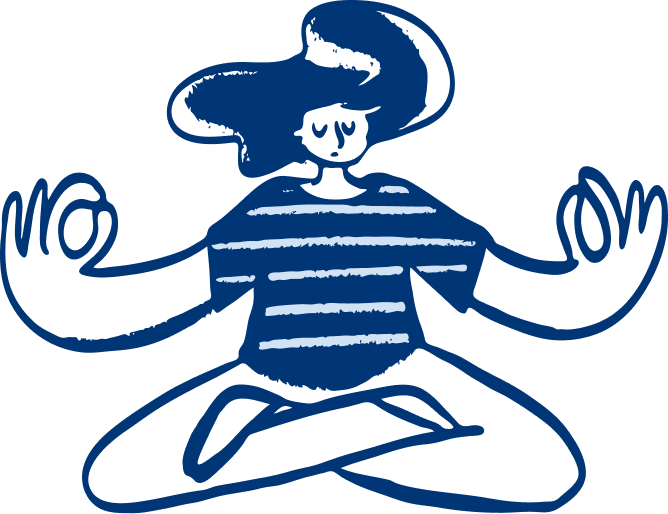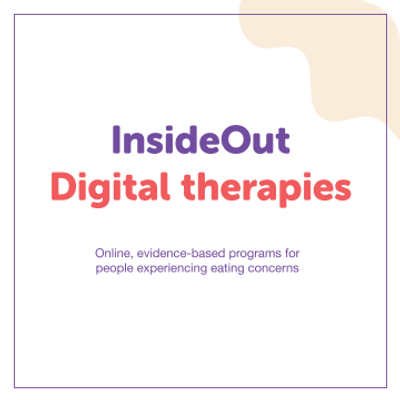Causes of eating challenges and EDs
If you’re experiencing eating challenges (disordered eating) or an eating disorder (ED), it’s not your fault. These thoughts, feelings, and patterns often show up as a way to cope with underlying emotions like frustration, self-doubt, or hopelessness.
You might experience eating challenges or an ED as a way to:
- Feel in control
- Manage stress
- Push down thoughts that feel too hard to face.
While these patterns may seem like they’re keeping you safe or functioning, they can also leave you feeling stuck or drained. It’s important to remember this: you are not your thoughts.
Below, you can learn about some of the common biological, emotional, and social influences that can lead to eating challenges and EDs.
Common factors
- Biological influences
- Family history: If EDs or mental health challenges run in your family, it can sometimes increase your chances of experiencing similar struggles
- Brain chemistry: The way your brain processes emotions or stress might make you more vulnerable to disordered eating patterns
- Hormonal changes: Shifts during puberty or other stages of life can affect how you see yourself or how you cope with tough emotions.
- Emotional influences
- Social and cultural influences
How dieting can influence eating challenges and EDs
Dieting is one of the strongest predictors of the development of an eating disorder.
The strict and restrictive nature of many diets can leave you feeling hungry, deprived, and frustrated. While you might try to ignore these feelings at first, the deprivation can build over time and lead to intense food cravings.
This can sometimes result in eating large amounts of food in response, which may leave you feeling guilty or like you’ve failed. These emotions can create a negative and overwhelming cycle, making food and eating feel stressful or shameful.
In today’s world, where everything is so accessible and immediate, there’s a cultural shift toward valuing instant gratification. It’s completely understandable to want quick results; this is something many of us have been conditioned to expect. But managing weight safely for health reasons can feel even harder when the desire for immediate change pushes us toward unsustainable or unhealthy behaviours.
To learn more about the connection between eating disorders and dieting, you can visit the National Eating Disorders Collaboration (NEDC) website.

Eating challenges and EDs are complex, and there’s rarely one single cause. If any of the above resonates with you, know that your experiences are valid, and support is always available.
Correcting common myths and misconceptions
Misunderstandings about eating challenges and EDs can make it harder to recognise what you’re going through or feel supported when reaching out for help.
Busting these myths can help you and those around you better understand the challenges of EDs and how to approach them with compassion.
- Myth: Eating disorders only affect young women
Truth: Eating disorders can affect anyone, no matter their age, gender, or background. If you’re struggling, it doesn’t matter who you are; you deserve support.

- Myth: Eating disorders are just about food or weight
Truth: Eating disorders are about so much more than what someone eats or how they look. They’re often tied to deeper struggles like trying to cope with overwhelming emotions or dealing with difficult experiences.
- Myth: You can tell someone has an eating disorder by looking at them
Truth: Eating disorders don’t have a ‘look’. You can’t always tell what someone is going through based on their weight or appearance. People of all shapes and sizes can experience serious challenges.
- Myth: Eating disorders aren’t serious
Truth: Eating disorders are complex conditions that affect both your body and your mind. Without treatment, they can lead to serious health risks. They deserve to be taken seriously.
- Myth: Eating disorders are a choice
Truth: You don’t choose to have an eating disorder. They develop from a mix of biological, emotional, and social/cultural influences. It’s important to approach yourself with kindness, not blame.
- Myth: Eating normally means an eating disorder is cured
Truth: Recovery isn’t just about food. It’s about healing the emotions, beliefs, and patterns that go with the eating disorder. Learning to eat again is just one part of the journey.
- Myth: People with eating disorders are seeking attention
Truth: Eating disorders are painful and serious struggles, not a way to seek attention. Your feelings are valid, and you deserve understanding, not judgement.
- Myth: Recovery isn’t possible
Truth: Recovery is absolutely possible. It might take time and patience, but with the right support, you can find a healthier and more peaceful relationship with food and yourself.
Remember, recognising and challenging these myths is a step toward understanding yourself with more compassion and hope. You’re not alone, and support is always available.
Click here to download, save, or print our eating and body image fact sheet.







